Seminar Report: “The Enhanced ‘Transhuman Muslim’: Islamic Ethico-Legal Reflections on Transhumanist Challenges”
The Research Center for Islamic Legislation and Ethics (CILE) hosted a compelling seminar featuring Dr. Serdar Kurnaz, Professor of Islamic Law at the Berlin Institute for Islamic Theology, Humboldt-Universität zu Berlin, and convened by Dr. Samer Rashwani (CILE) The discussion addressed how transhumanist ideals challenge core Islamic concepts like the main principles and ethical foundations of Islamic law (qawāʿid), moral responsibility (taklīf, ahliyya), physical integrity (ḥurma), and ritual observance (ʿibādāt).
Prof. Kurnaz began by contextualizing transhumanism as a growing philosophical and scientific movement that seeks to enhance the human condition through technologies such as cognitive augmentation, physical enhancements (e.g., genetic engineering, prosthetics), longevity/immortality (e.g., anti-aging technologies), and enhancing human perception (e.g., transferring consciousness to avatars). While such developments may seem revolutionary, they raise serious theological and ethical questions for Islamic thought. He also noted that there is currently very limited scholarly engagement with transhumanism from the perspective of Islamic law. He hinted at two journals that focus on the topic: Journal of Ethics and Emerging Technologies, 34/2 (2024): Transhumanism & Islam and Ilahiyat Studies 14/1 (2023): Transhumanism & Artificial Intelligence.
One of the central issues Dr. Kurnaz addressed was the tension between classical Islamic jurisprudence (uṣūl al-fiqh), which relies heavily on deontological (duty-based) ethics, and more modern approaches that employ consequentialist reasoning through the framework of maqāṣid al-sharīʿa—the higher objectives of Islamic law. Although Islam generally permits technological advancements under the principle of ibāḥa aṣliyya (original permissibility), any such innovation must be carefully examined for its compatibility with core Islamic values. According to Dr. Kurnaz, the promise of post-human enhancement cannot be fully embraced without considering its potential to disrupt concepts like human dignity, natural disposition (fiṭra), and divine trust (amāna).
Dr. Kurnaz further explained that Islamic legal responsibility is traditionally grounded in physical and mental maturity – most notably puberty and rational capacity (ʿaql). However, transhumanist visions of consciousness detached from the body, or enhanced beyond human norms, challenge this framework. Dr. Kurnaz referred to classical scholars like Molla Khusraw (d. 885/1480), who linked accountability to the soul’s intellect — “material intellect” (ʿaql hayūlānī), “dispositional intellect” (ʿaql bi-l-malaka), “actual intellect” (ʿaql bi-l-fiʿl), “acquired knowledge” (ʿaql mustafād) — to highlight the vagueness that arises when personhood is no longer bound to biology. He asked whether a digitized mind or AI could be held morally responsible, and whether it could possess the legal and spiritual capacity required by Islamic law.
This led naturally into a discussion of ḥurma, the sacredness of the human body. Dr. Kurnaz reminded the audience that in Islam, the body is not mere matter; it is entrusted by God and protected by strict ethical norms. Surgical interventions, such as organ transplants, are allowed only under necessity (ḍarūra), and the deceased must be treated with respect, including proper burial without being harmed or altered. In contrast, transhumanist ideas that treat the body as replaceable or obsolete—such as uploading consciousness or modifying bodies beyond recognition—risk violating this principle.
Rituals (ʿibādāt) such as prayer, fasting, and pilgrimage are embodied practices that rely on physical acts and biological experiences. For instance, prayer (ṣalāh) requires ritual purity (ṭahāra), which presumes the presence of a body. Fasting (ṣawm) entails abstaining from food and sexual activity, both rooted in physical need. Pilgrimage (ḥajj), perhaps the most physically demanding act of worship, emphasizes spiritual discipline through bodily hardship and geographic travel. Dr. Kurnaz questioned whether a digital avatar or disembodied consciousness could meaningfully fulfill such obligations, or whether attempts to simulate rituals through virtual reality risk emptying them of their spiritual substance.
To ground these theoretical discussions, Dr. Kurnaz explored several case studies. One example was the use of brain-computer interfaces to facilitate Quran memorization for the performance of the prayer. While potentially helpful, especially for non-Arabic speakers (could be allowed as a concession (rukhsa), he raised concerns that mechanized learning could erode the devotional effort (ijtihād) and reward (thawāb) traditionally associated with memorization. Similarly, the idea of robot imams was examined. Although machines could recite the Quran and perform tasks with precision, they lack essential elements such as intention (niyya) and ritual purity (ṭahāra). Islamic legal precedent excludes non-human entities from leading prayer, and AI’s ambiguous status challenges this norm. Another example was artificial wombs (ectogenesis) for the purpose of avoiding physical demands and dangers of pregnancy, which could undermine procreation ethics and Islamic laws of kinship (nasab), inheritance, and the elevated status of motherhood in Islam.
Dr. Kurnaz concluded by identifying systemic challenges that Islamic law must face in light of these technologies. Among them are the destabilization of gender norms—Islamic law is built around male, female, and intersex (khunthā) categories, which non-gendered avatars defy—as they invalidate marriage, inheritance, and modesty laws. Bodily resurrection (ḥashr) is a central part of Islamic teachings about the afterlife, and the idea of digital immortality could contradict this belief. Additionally, he warned of the socioeconomic implications of enhancement technologies, which may favor the wealthy and deepen inequality, conflicting with Islamic principles of equity and justice.
In closing, Dr. Kurnaz stressed the need for interdisciplinary ijtihād—a collaborative effort among scholars, ethicists, and scientists—to address these emerging challenges without compromising core Islamic principles. Enhancements should prioritize necessity (ḍarūra) and public interest (maṣlaḥa), not mere convenience. While Islamic law has shown remarkable adaptability through the ages, it must tread carefully in redefining personhood, ritual, and morality in a post-human world.
